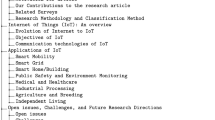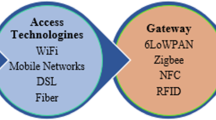Abstract
The emergence of Internet of Things (IoT) has paved the way to realize ubiquitous access to manifold services and applications. Effective utilization of these services vitally demands secure deployment of IoT systems where data or information can be transmitted without worrying about the uncertainty of different devices in the system. Trust Management Systems (TMS) have proved themself as impressive solutions to attain this security requirement where entities are judged based on their behavior. For IoT, influential deployment of TMS requires coping with characteristics of IoT systems such as device heterogeneity, context-awareness, dynamicity, etc. Paying attention to the quality of received data for reliable service composition and accurate assessment is also a matter of concern. This paper presents a direct observation-based distributed trust management scheme, called BD-Trust, in which trust is measured by integrating behavioral trust of devices with the data trust. For evaluation of behavioral trust, BD-Trust reckons on three trust parameters, namely success rate, satisfaction level, and credibility. Data trust is measured considering consistency in received data values for the successful interaction responses. BD-Trust employs a trust update mechanism to alleviate the effect of malicious devices that try to disrupt the process of trust management. An adaptive decay factor has been designed to reflect previously observed trust value in recent computation while updating trust scores. The effectiveness of BD-Trust has been validated through simulation experiments and results have been compared with two state-of-art schemes for trust convergence, assessment accuracy, and resilience against attacks, considering a dynamic environment.









Similar content being viewed by others
References
Altaf A, Abbas H, Iqbal F, Derhab A (2019) Trust models of Internet of smart things: a survey, open issues, and future directions. J Netw Comput Appl 137:93–111
Assiri A, Almagwashi H (2018) IoT security and privacy issues. In: 2018 1st international conference on computer applications & information security (ICCAIS), IEEE, pp 1–5
Azzedin F, Ghaleb M (2019) Internet-of-things and information fusion: trust perspective survey. Sensors 19(8):1929
Bandyopadhyay D, Sen J (2011) Internet of things: applications and challenges in technology and standardization. Wirel Pers Commun 58(1):49–69
Bao F, Chen IR (2012) Dynamic trust management for internet of things applications. In: Proceedings of the 2012 international workshop on self-aware internet of things, pp 1–6
Bao F, Chen R, Guo J (2013) Scalable, adaptive and survivable trust management for community of interest based internet of things systems. In: 2013 IEEE eleventh international symposium on autonomous decentralized systems (ISADS), IEEE, pp 1–7
Bormann C, Ersue M, Keranen A (2014) Terminology for constrained-node networks. Fremont, CA, USA, Internet Engineering Task Force (IETF), pp 1721–2070
Buckland M, Gey F (1994) The relationship between recall and precision. J Am Soc Inf Sci 45(1):12–19
Carneiro G (2010) NS-3: network simulator 3. In: UTM Lab Meeting April, vol 20, pp 4–5
Chae Y, DiPippo LC, Sun YL (2014) Trust management for defending on-off attacks. IEEE Trans Parallel Distrib Syst 26(4):1178–1191
Chen R, Guo J, Bao F (2014) Trust management for SOA-based IoT and its application to service composition. IEEE Trans Serv Comput 9(3):482–495
Chen J, Tian Z, Cui X, Yin L, Wang X (2019) Trust architecture and reputation evaluation for internet of things. J Ambient Intell Humaniz Comput 10(8):3099–3107
Cho JH, Swami A, Chen R (2010) A survey on trust management for mobile ad hoc networks. IEEE Commun Surv Tutor 13(4):562–583
Da Xu L, He W, Li S (2014) Internet of things in industries: a survey. IEEE Trans Ind Inform 10(4):2233–2243
Feng R, Han X, Liu Q, Yu N (2015) A credible Bayesian-based trust management scheme for wireless sensor networks. Int J Distrib Sens Netw 11(11):1–9
Ghaleb M, din F (2021) Towards scalable and efficient architecture for modeling trust in IoT environments. Sensors 21(9):2986–3011
Guo J, Chen R, Tsai JJ (2017) A survey of trust computation models for service management in internet of things systems. Comput Commun 97:1–14
Hendler J (2009) Web 3.0 emerging. Computer 42(1):111–113
Hoffman K, Zage D, Nita-Rotaru C (2009) A survey of attack and defense techniques for reputation systems. ACM Comput Surv (CSUR) 42(1):1–31
Jayasinghe U, Otebolaku A, Um TW, Lee GM (2017) Data centric trust evaluation and prediction framework for IoT. In: 2017 ITU kaleidoscope: challenges for a data-driven society (ITU K), IEEE, pp 1–7
Josang A, Ismail R (2002) The beta reputation system. In: Proceedings of the 15th bled electronic commerce conference, vol 5, pp 2502–2511
Junior FMR, Kamienski CA (2021) A survey on trustworthiness for the internet of things. IEEE Access 9:42493–42514
Laner M, Nikaein N, Svoboda P, Popovic M, Drajic D, Krco S (2015) Traffic models for machine-to-machine (m2m) communications: types and applications. In: Machine-to-machine (M2M) communications. Elsevier, pp 133–154
Mahmud M, Kaiser MS, Rahman MM, Rahman MA, Shabut A, Al-Mamun S, Hussain A (2018) A brain-inspired trust management model to assure security in a cloud based IoT framework for neuroscience applications. Cogn Comput 10(5):864–873
Manchala DW (2000) E-commerce trust metrics and models. IEEE Internet Comput 4(2):36–44
Mendoza CV, Kleinschmidt JH (2015) Mitigating on-off attacks in the internet of things using a distributed trust management scheme. Int J Distrib Sens Netw 11(11):859731
Nitti M, Girau R, Atzori L, Iera A, Morabito G (2012) A subjective model for trustworthiness evaluation in the social internet of things. In: 2012 IEEE 23rd international symposium on personal. Indoor and mobile radio communications-(PIMRC), IEEE, pp 18–23
Pełech-Pilichowski T (2018) On adaptive prediction of nonstationary and inconsistent large time series data. 2018 41st International Convention on Information and Communication Technology. Electronics and Microelectronics (MIPRO), IEEE, pp 1260–1265
Rasmusson L, Jansson S (1996) Simulated social control for secure internet commerce. In: Proceedings of the 1996 workshop on new security paradigms, pp 18–25
Saied YB, Olivereau A, Zeghlache D, Laurent M (2013) Trust management system design for the internet of things: a context-aware and multi-service approach. Comput Secur 39:351–365
Shaikh E, Mohiuddin I, Manzoor A (2019) Internet of things (IoT): security and privacy threats. In: 2019 2nd international conference on computer applications & information security (ICCAIS), IEEE, pp 1–6
Sharma A, Pilli ES, Mazumdar AP (2017a) Obviating capricious behavior in internet of things. In: 2017 international conference on advances in computing. Communications and informatics (ICACCI), IEEE, pp 480–486
Sharma A, Pilli ES, Mazumdar AP (2017b) Trust management in IoT. In: Foundation for smart cities, ehealth, and ubiquitous computing. Taylor & Francis, pp 221–240
Sharma A, Pilli ES, Mazumdar AP, Gera P (2020) Towards trustworthy internet of things: a survey on trust management applications and schemes. Comput Commun 160:475–493
Sicari S, Rizzardi A, Grieco LA, Coen-Porisini A (2015) Security, privacy and trust in internet of things: the road ahead. Comput Netw 76:146–164
Souissi I, Azzouna NB, Said LB (2019) A multi-level study of information trust models in WSN-assisted IoT. Comput Netw 151:12–30
Stankovic JA (2014) Research directions for the internet of things. IEEE Internet Things J 1(1):3–9
Stoica I, Morris R, Liben-Nowell D, Karger DR, Kaashoek MF, Dabek F, Balakrishnan H (2003) Chord: a scalable peer-to-peer lookup protocol for internet applications. IEEE/ACM Trans Netw 11(1):17–32
Sun YL, Han Z, Yu W, Liu KR (2006) Attacks on trust evaluation in distributed networks. In: 2006 40th annual conference on information sciences and systems, IEEE, pp 1461–1466
Ting HLJ, Kang X, Li T, Wang H, Chu CK (2021) On the trust and trust modeling for the future fully-connected digital world: a comprehensive study. IEEE Access 9:106743–106783
Yan Z, Zhang P, Vasilakos AV (2014) A survey on trust management for internet of things. J Netw Comput Appl 42:120–134
Yu Y, Li K, Zhou W, Li P (2012) Trust mechanisms in wireless sensor networks: attack analysis and countermeasures. J Netw Comput Appl 35(3):867–880
Yu Y, Jia Z, Tao W, Xue B, Lee C (2017) An efficient trust evaluation scheme for node behavior detection in the internet of things. Wirel Pers Commun 93(2):571–587
Author information
Authors and Affiliations
Corresponding author
Ethics declarations
Conflict of interest
The authors have no conflicts of interest to declare that are relevant to the content of this article. The authors have no relevant financial or non-financial interests to disclose. This article does not contain any studies with human participants or animals performed by any of the authors.
Additional information
Publisher's Note
Springer Nature remains neutral with regard to jurisdictional claims in published maps and institutional affiliations.
Rights and permissions
About this article
Cite this article
Sharma, A., Pilli, E.S. & Mazumdar, A.P. BD-Trust: behavioural and data trust management scheme for internet of things. J Ambient Intell Human Comput 14, 16195–16207 (2023). https://doi.org/10.1007/s12652-022-03841-w
Received:
Accepted:
Published:
Issue Date:
DOI: https://doi.org/10.1007/s12652-022-03841-w




